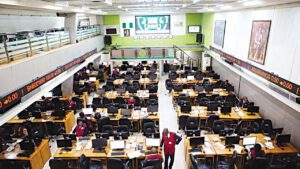


New interest rate hike further hurts stocks
Nigeria’s equities market on Tuesday failed to sustain its positive start to this week as stock investors continued to price in the outcome of the Monetary Policy Committee (MPC) meeting where the Central Bank of Nigeria (CBN) further ramped up tightening measures to rein in inflation.
Rising from its two-day meeting, the Monetary Policy Committee of the Central Bank of Nigeria raised the Monetary Policy Rate (MPR), also known as the benchmark interest rate, to 26.75 percent from 26.25 percent which further makes equities less attractive than fixed-income instruments.
Stock investors booked about N47 billion loss as the market decreased by 0.08 percent on Tuesday, which moderated the returns this year to 34.39 percent. Banking and insurance stocks were on offer, though consumer goods stocks saw slight bargains.
The Nigerian Exchange Limited (NGX) All-Share Index and Market Capitalisation decreased from preceding day’s highs of 100,568.63 points and N56.945 trillion to 100,486.12 points and N56.898 trillion. Investors in 8,403 deals traded 280.922 million shares worth N3.625 billion.
“In a bid to address rising inflationary pressures while simultaneously creating an attractive environment for foreign investment, the Monetary Policy Committee (MPC) has been aggressive in raising policy rates,” said FBNQuest analysts in their July 23 note.
With an eye on combating inflation and fostering a favourable climate for foreign investment, the MPR hike represents a 50-basis point, lowest rate hike since February 2024 when inflation was 31.70 percent.
The asymmetric corridor was adjusted from +100/-300 to +500/-100 around the MPR, while the liquidity ratio was retained at 30 percent. The cash reserve ratio (CRR) was retained at 45 percent for deposit money banks and at 14 percent for merchant banks.
Market watchers have seen increased sentiments in the fixed-income market primarily driven by a consistent hike in the Monetary Policy Rate (MPR) which has pushed bond yields to higher regions.
This month, the market has decreased by 0.05 percent, while this month it has risen by 0.43 percent.
“This is expected to continue in the latter part of the year, as the governor of the central bank has continuously clamoured for higher interest rates in a bid to tame inflation.
“As we enter the second half of 2024, three key variables are expected to influence interest rate decisions: moderation in inflation, accretion to foreign reserves, and exchange rate stability,” Comercio Partner, research analysts, said in their recent macroeconomic outlook.



